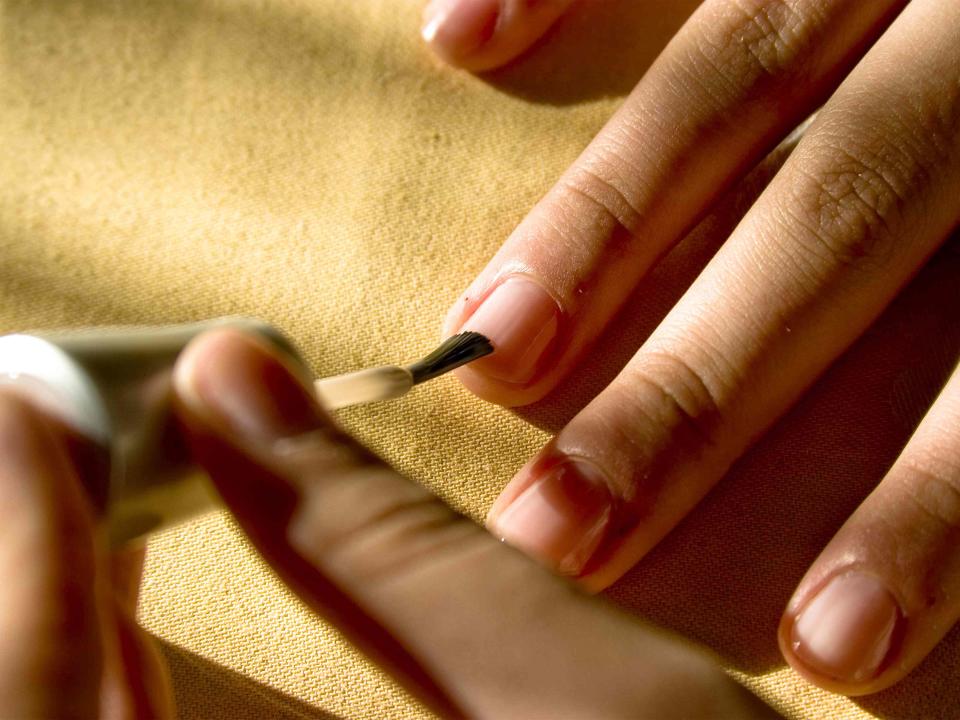Do You Really Need a Nail Hardener? The Experts Answer
Raise a hand if you want stronger nails.

Getty
There’s nothing like a chipped nail to ruin your new mani mojo. Sure, you can try to clip or file your broken nails down, but even short nails can continue to crack if they're prone to breakage. Brittle, peeling nails can be pretty painful, but fortunately, the solution might be as easy as a swipe of nail hardener. We're taking a deep dive into how nail hardeners might be the key to more resilient, stronger nails — and how to safely incorporate them into your routine.
Related:6 Expert-Approved Ways to Strengthen Damaged Nails
What Is Nail Hardener?
Not to be confused with nail softeners or nail strengtheners (more on those below), “nail hardeners are short-term treatments that work to harden your nail plate — the visible part of the nail — to prevent them from splitting and breaking,” says nail expert Queenie Nguyen.
How Do Nail Hardeners Work?
Keratin is a type of protein that is found in everything from your nails to your hair to your skin. “Nail hardeners work by binding the keratin protein in your nails more tightly and hardening your nail plates, making them less flexible,” says Nguyen.
Keep in mind that they're rarely considered clean. “They typically contain ingredients such as formaldehyde, toluene, calcium, and various proteins, which work to reinforce and fortify the nail bed,” says Yashi Shrestha, cosmetic chemist and director of science and research at Novi Connect. Ethyl acetate and methylene glycol are other bonding agents commonly found in nail hardeners.
Who Should Be Using a Nail Hardener?
Nail hardeners are designed for those who need a quick fix to strengthen their soft, bendy nails. “Hardeners are for those who are having extreme difficulty growing out their nails, and the nail breakages are causing pain,” says Nguyen. On the other hand, nail softeners (or conditioners) are for those lacking nail moisture.
Nail strengtheners, meanwhile, are “great for someone who already has nails that are in good shape and wants to prevent brittle or unhealthy nails," she says. "Strengtheners contain ingredients like keratin, which penetrates between the nail layers to help strengthen the nail plate over a period of time."
How to Use a Nail Hardener
Using a nail hardener is pretty straightforward — they’re usually transparent or translucent and are applied just like any nail polish. “Start with clean nails, then use a nail hardener as a base coat underneath your nail polish, or it can be used alone," says Shrestha. "You can also use them with other nourishing nail care products, such as cuticle oil and moisturizer."
While you're repairing your nails, you might want to skip the polish. “Typically, you apply nail hardener once a week to encourage healthy nail growth,” adds Nguyen.
Related:A Glass Nail File Is the Secret Weapon Your Nails Need
Are Nail Hardeners Safe?
Though nail hardeners are safe and FDA-approved, consistent or excessive use can actually have the opposite effect of what they’re intended to do. “It’s important to use them as directed," says Shrestha. "Since ingredients like formaldehyde or toluene found in some nail hardeners are harsh chemicals, they can potentially damage your nails or cause dryness, making them even more prone to breakage and chipping."
Plus, formaldehyde could trigger an allergic reaction — so it's best to use them in moderation, polish in a well-ventilated area, and skip them if you notice irritation. Want a formaldehyde-free option? Try Sally Hansen Treatment Hard as Nails Serum. Another option is OPI Repair Mode Bond Building Nail Serum, which isn't billed as a nail hardener but can repair damaged nails in a matter of days.
How Long Does It Take to Work?
Consistency is key, but you don’t want to remain dependent on nail hardeners forever. “The time it takes to see the benefits of a nail hardener can vary depending on the individual and the product being used," Shrestha says. "In general, you may start to see some improvement in the strength and resilience of your nails within a few weeks of using a nail hardener regularly."
However, for long-term results, it pays to be consistent. Also, take time to scope out your nails between manicures. “I suggest looking at your nails closely to feel the difference in nail strength before slowing down the usage of the nail hardener," Nguyen says. "Use nail hardener as a short-term treatment to grow out your nails. Once they grow out, switch over to a nail strengthener to maintain and protect your nails over a longer period of time."
Other Tricks to Strengthen Nails
It’s important to rule out serious health concerns like anemia contributing to your brittle nails. “Eating healthy food, drinking plenty of water, and getting rough exercise can help strengthen your health from within and therefore can help harden your nails over time,” says Nguyen.
Also, pay attention to how you handle your hands and nails doing your daily activities. For example, wear protective gloves when you wash the dishes to avoid excessive exposure to water, use a box cutter to open packages instead of your fingers, and take a break from manicures since the chemicals in nail polish and the removal process can be brutal on nails. If you simply can’t live without a mani or you love how your nails feel after using a hardener, “look into vegan nail polishes and treatments that don’t have those harsh chemicals,” says Nguyen.
Related:The Italian Manicure Will Give You Longer-Looking Nails Without Acrylics
For more InStyle news, make sure to sign up for our newsletter!
Read the original article on InStyle.

